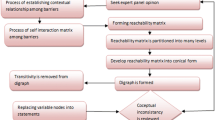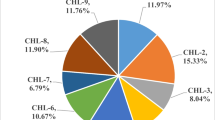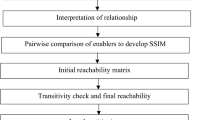Abstract
The study aims to identify, assess, and prioritise barriers to adopting industry 4.0 technology for decarbonisation in the steel industry. It also develops a barrier intensity index of industry 4.0 technologies for decarbonisation. The barriers to industry 4.0 technologies are identified through literature review and semi-structured interviews, and then it is classified into three major categories using technological organisational and environmental theory. The fuzzy Delphi method has been used to finalise these barriers. Then, three major categories of barriers and 21 sub-barriers are prioritised using the best–worst method. The study proposes a self-assessment framework for assessing the intensity of barriers by applying the Graph Theory Matrix approach. This framework is illustrated with the help of an Indian case of steel manufacturing organisation. The findings of the study indicate that a lack of supportive infrastructure followed by a lack of real-time control system and longer learning time due to poor knowledge transfer are the significant barriers to the adoption of industry 4.0 technologies for decarbonisation in the steel industry. Using the proposed self-assessment framework, a steel manufacturing organisation can analyse its position, identify gaps, and work on potential areas of improvement. Insights from this study can help in attaining sustainable development goals (13) i.e., climate action and net zero economy goal.




Similar content being viewed by others
Data availability
Data related to this paper is available with authors and will be available whenever required.
Notes
Transforming the Steel Industry May Be the Ultimate Climate Challenge | BCG available at: https://www.bcg.com/publications/2022/steel-industry-carbon-emissions-challenge-solutions
Sustainable Energy for All (SEforALL) Strategic Direction (Detailed) (un.org) available at: https://www.un.org/millenniumgoals/pdf/SEFA.pdf (Accessed on 15th March, 2023)
References
Abdul-Hamid, A. Q., Ali, M. H., Tseng, M. L., Lan, S., & Kumar, M. (2020). Impeding challenges on industry 4.0 in circular economy: Palm oil industry in Malaysia. Computers & Operations Research, 123, 105052. https://doi.org/10.1016/J.COR.2020.105052
Abed, S. S. (2020). Social commerce adoption using TOE framework: An empirical investigation of Saudi Arabian SMEs. International Journal of Information Management, 53, 102118. https://doi.org/10.1016/J.IJINFOMGT.2020.102118
Abkenar, Z. A., Lajimi, H. F., Hamedi, M., Parkouhi, S. V. (2022). Determining the importance of barriers to IoT implementation using bayesian best-worst method. (pp. 144–159)
Agarwal, S., & Singh, A. P. (2022). Performance evaluation of textile wastewater treatment techniques using sustainability index: An integrated fuzzy approach of assessment. Journal of Cleaner Production, 337, 130384. https://doi.org/10.1016/J.JCLEPRO.2022.130384
Ali, I., & Aboelmaged, M. G. S. (2021). Implementation of supply chain 4.0 in the food and beverage industry: perceived drivers and barriers. International Journal of Productivity and Performance Management Ahead-of-Print. https://doi.org/10.1108/IJPPM-07-2020-0393
Bag, S., Wood, L. C., Telukdarie, A., & Venkatesh, V. G. (2021). Application of Industry 4.0 tools to empower circular economy and achieving sustainability in supply chain operations. Production Planning and Control. https://doi.org/10.1080/09537287.2021.1980902
Bhandari, D., Singh, R. K., & Garg, S. K. (2019). Prioritisation and evaluation of barriers intensity for implementation of cleaner technologies: Framework for sustainable production. Resources, Conservation and Recycling, 146, 156–167. https://doi.org/10.1016/J.RESCONREC.2019.02.038
Bhaskar, A., Assadi, M., & Somehsaraei, H. N. (2020). Decarbonization of the iron and steel industry with direct reduction of iron ore with green hydrogen. Energies, 2020(13), 75813. https://doi.org/10.3390/EN13030758
Branca, T. A., Fornai, B., Colla, V., Murri, M. M., Streppa, E., & Schröder, A. J. (2020). The challenge of digitalization in the steel sector. Metals, 10, 288. https://doi.org/10.3390/met10020288
Bui, T. D., Tsai, F. M., Tseng, M. L., & Ali, M. D. H. (2020). Identifying sustainable solid waste management barriers in practice using the fuzzy Delphi method. Resources, Conservation and Recycling, 154, 104625. https://doi.org/10.1016/J.RESCONREC.2019.104625
Chen, B., Wan, J., Shu, L., Li, P., Mukherjee, M., & Yin, B. (2017). Smart factory of industry 4.0: Key technologies, application case, and challenges. IEEE Access, 6, 6505–6519. https://doi.org/10.1109/ACCESS.2017.2783682
Cheng, J., Westman, J. (2020). Effects of digitalization in steel industry: Economic impacts and investment model.
Cruz-Jesus, F., Pinheiro, A., & Oliveira, T. (2019). Understanding CRM adoption stages: Empirical analysis building on the TOE framework. Computers in Industry, 109, 1–13. https://doi.org/10.1016/J.COMPIND.2019.03.007
De Groot, H. L., Verhoef, E. T., & Nijkamp, P. (2001). Energy saving by firms: decision-making, barriers and policies. Energy Economics, 23(6), 717–740.
Deloitte. (2014). Bridging the talent gap: Engineering a new workforce for the steel industry. (pp. 1–16)
Dubey, R., Gunasekaran, A., Childe, S. J., Wamba, S. F., & Papadopoulos, T. (2016). The impact of big data on world-class sustainable manufacturing. The International Journal of Advanced Manufacturing Technology, 84, 631–645.
Dubey, R., Gunasekaran, A., & Papadopoulos, T. (2017). Green supply chain management: Theoretical framework and further research directions. Benchmarking: An International Journal, 24(1), 184–218.
Fathi, M., & Ghobakhloo, M. (2020). Enabling mass customization and manufacturing sustainability in industry 4.0 context: A novel heuristic algorithm for in-plant material supply optimization. Sustainability, 12(16), 6669.
Forbert, H., & Marx, D. (2003). Calculation of the permanent of a sparse positive matrix. Computer Physics Communications, 150, 267–273. https://doi.org/10.1016/S0010-4655(02)00683-5
Fragassa, C., Babic, M., Bergmann, C. P., & Minak, G. (2019). Predicting the tensile behaviour of cast alloys by a pattern recognition analysis on experimental data. Metals, 9(5), 557.
Gajdzik, B., & Wolniak, R. (2021). Transitioning of steel producers to the steelworks 4.0—Literature review with case studies. Energies, 14, 4109. https://doi.org/10.3390/EN14144109
Glass, R., Meissner, A., Gebauer, C., Stürmer, S., Metternich, J. (2018). Identifying the barriers to Industrie 4.0. in Procedia CIRP. (pp. 985–988). Elsevier B.V
Govindan, K., & Hasanagic, M. (2018). A systematic review on drivers, barriers, and practices towards circular economy: a supply chain perspective. International Journal of Production Research, 56(1–2), 278-311.
Gupta, A., & Singh, R. K. (2021). Applications of emerging technologies in logistics sector for achieving circular economy goals during COVID 19 pandemic: Analysis of critical success factors. International Journal of Logistics Research and Applications. https://doi.org/10.1080/13675567.2021.1985095
Gupta, A., & Singh, R. K. (2020). Study of sustainability issues in an Indian logistics service provider: SAP-LAP approach. Qualitative Research in Organizations and Management: An International Journal. https://doi.org/10.1108/QROM-02-2020-1897
Hanoglu, U., & Šarler, B. (2019). Hot rolling simulation system for steel based on advanced meshless solution. Metals, 9(7), 788.
Harris, J., Anderson, J., & Shafron, W. (2000). Investment in energy efficiency: a survey of Australian firms. Energy policy, 28(12), 867–876.
Hopkins, J. L. (2021). An investigation into emerging industry 4.0 technologies as drivers of supply chain innovation in Australia. Computers in Industry, 125, 103323. https://doi.org/10.1016/J.COMPIND.2020.103323
Jayakrishna, K., Vinodh, S., & Anish, S. (2016). A graph theory approach to measure the performance of sustainability enablers in a manufacturing organization. International Journal of Sustainable Engineering, 9, 47–58. https://doi.org/10.1080/19397038.2015.1050970
Jayashree, S., Reza, M. N. H., Malarvizhi, C. A. N., Gunasekaran, A., & Rauf, M. A. (2022). Testing an adoption model for Industry 4.0 and sustainability: A Malaysian scenario. Sustainable Production and Consumption, 31, 313–330. https://doi.org/10.1016/J.SPC.2022.02.015
John, N., Wesseling, J. H., Worrell, E., & Hekkert, M. (2022). How key-enabling technologies’ regimes influence sociotechnical transitions: The impact of artificial intelligence on decarbonization in the steel industry. Journal of Cleaner Production, 370, 133624. https://doi.org/10.1016/J.JCLEPRO.2022.133624
Kablan, M. M. (2003). Energy conservation projects implementation at Jordan’s industrial sector: a total quality management approach. Energy, 28(15), 1533−1543.
Kamble, S. S., Gunasekaran, A., & Sharma, R. (2018). Analysis of the driving and dependence power of barriers to adopt industry 4.0 in Indian manufacturing industry. Computers in Industry, 101, 107–119. https://doi.org/10.1016/J.COMPIND.2018.06.004
Khan, S. A. R., Razzaq, A., Yu, Z., & Miller, S. (2021). Industry 4.0 and circular economy practices: A new era business strategies for environmental sustainability. Business Strategy and the Environment, 30, 4001–4014. https://doi.org/10.1002/bse.2853
Kristoffersen, E., Blomsma, F., Mikalef, P., & Li, J. (2020). The smart circular economy: A digital-enabled circular strategies framework for manufacturing companies. Journal of Business Research, 120, 241–261. https://doi.org/10.1016/j.jbusres.2020.07.044
Kumar, D., Singh, R. K., Mishra, R., & Vlachos, I. (2023). Big data analytics in supply chain decarbonisation: a systematic literature review and future research directions. International Journal of Production Research, 1–21
Kusi-Sarpong, S., Gupta, H., Khan, S. A., ChiappettaJabbour, C. J., Rehman, S. T., & Kusi-Sarpong, H. (2021). Sustainable supplier selection based on industry 4.0 initiatives within the context of circular economy implementation in supply chain operations. Production Planning and Control. https://doi.org/10.1080/09537287.2021.1980906
Lombardi, R. (2019). Knowledge transfer and organizational performance and business process: Past, present and future researches. Business Process Management Journal, 25, 2–9. https://doi.org/10.1108/BPMJ-02-2019-368/FULL/PDF
Luthra, S., Garg, D., Mangla, S.K., Singh Berwal, Y.P. (2018). Analyzing challenges to Internet of Things (IoT) adoption and diffusion: An Indian context, in Procedia Computer Science. (pp. 733–739). Elsevier B.V
Ma, Z., Shao, C., Ma, S., & Ye, Z. (2011). Constructing road safety performance indicators using fuzzy delphi method and grey delphi method. Expert Systems with Applications, 38, 1509–1514. https://doi.org/10.1016/j.eswa.2010.07.062
Majumdar, A., Garg, H., & Jain, R. (2021). Managing the barriers of Industry 4.0 adoption and implementation in textile and clothing industry: Interpretive structural model and triple helix framework. Computers in Industry, 125, 103372. https://doi.org/10.1016/J.COMPIND.2020.103372
Maroufkhani, P., Tseng, M. L., Iranmanesh, M., Ismail, W. K. W., & Khalid, H. (2020). Big data analytics adoption: Determinants and performances among small to medium-sized enterprises. International Journal of Information Management, 54, 102190.
Masood, T., & Egger, J. (2019). Augmented reality in support of Industry 4.0—Implementation challenges and success factors. Robotics and Computer-Integrated Manufacturing, 58, 181–195.
Mishra, R., Singh, R., & Govindan, K. (2022). Net-zero economy research in the field of supply chain management: a systematic literature review and future research agenda. The International Journal of Logistics Management, (ahead-of-print).
Miśkiewicz, R., & Wolniak, R. (2020). Practical application of the industry 4.0 concept in a steel company. Sustainability, 12, 5776.
Mittal, V. K., Egede, P., Herrmann, C., & Sangwan, K. S. (2013). Comparison of drivers and barriers to green manufacturing: a case of India and Germany. In Re-engineering Manufacturing for Sustainability: Proceedings of the 20th CIRP International Conference on Life Cycle Engineering, Singapore 17–19 April, 2013 (pp. 723–728). Springer: Singapore.
Moktadir, M. A., Ali, S. M., Kusi-Sarpong, S., & Shaikh, M. A. A. (2018). Assessing challenges for implementing industry 4.0: Implications for process safety and environmental protection. Process Safety and Environmental Protection, 117, 730–741. https://doi.org/10.1016/J.PSEP.2018.04.020
Montoya-Torres, J. R., Gutierrez-Franco, E., & Blanco, E. E. (2015). Conceptual framework for measuring carbon footprint in supply chains. Production Planning and Control, 26, 265–279. https://doi.org/10.1080/09537287.2014.894215
Mote, N. J. I., & Karadas, G. (2022). The impact of automation and knowledge workers on employees’ outcomes: Mediating role of knowledge transfer. Sustainability, 14, 1377. https://doi.org/10.3390/SU14031377
Muduli, K., Govindan, K., Barve, A., & Geng, Y. (2013). Barriers to green supply chain management in Indian mining industries: a graph theoretic approach. Journal of Cleaner Production, 47, 335–344.
Muscio, A., & Ciffolilli, A. (2019). What drives the capacity to integrate Industry 40 technologies? Evidence from European R&d Projects, 29, 169–183. https://doi.org/10.1080/10438599.2019.1597413
Muslemani, H., Liang, X., Kaesehage, K., Ascui, F., & Wilson, J. (2021). Opportunities and challenges for decarbonizing steel production by creating markets for ‘green steel’ products. Journal of Cleaner Production, 315, 128127. https://doi.org/10.1016/J.JCLEPRO.2021.128127
Nandi, S., Sarkis, J., Hervani, A. A., & Helms, M. M. (2021). Redesigning supply chains using blockchain-enabled circular economy and COVID-19 experiences. Sustainable Production and Consumption. https://doi.org/10.1016/j.spc.2020.10.019
Neef, C., Hirzel, S., Karlsruhe, M.A. (2018). Industry 4.0 in the European iron and steel industry: Towards an overview of implementations and perspectives working document. Karlsruhe
Ocampo, L., Ebisa, J. A., Ombe, J., & GeenEscoto, M. (2018). Sustainable ecotourism indicators with fuzzy Delphi method—A Philippine perspective. Ecological Indicators, 93, 874–888. https://doi.org/10.1016/J.ECOLIND.2018.05.060
Ozkan-Ozen, Y. D., Kazancoglu, Y., & Kumar Mangla, S. (2020). Synchronized barriers for circular supply chains in industry 3.5/industry 4.0 transition for sustainable resource management. Resources, Conservation and Recycling. https://doi.org/10.1016/j.resconrec.2020.104986
Padilla-Rivera, A., Do Carmo, B. B. T., Arcese, G., & Merveille, N. (2021). Social circular economy indicators: Selection through fuzzy delphi method. Sustainable Production and Consumption, 26, 101–110. https://doi.org/10.1016/J.SPC.2020.09.015
Priyadarshini, J., Singh, R. K., Mishra, R., & Mustafa Kamal, M. (2022). Adoption of additive manufacturing for sustainable operations in the era of circular economy: Self-assessment framework with case illustration. Computers and Industrial Engineering, 171, 108514. https://doi.org/10.1016/j.cie.2022.108514
PwC and Indian Steel Association. (2019). The Indian steel industry: Growth, challenges and digital disruption. Available online at : https://www.pwc.in/assets/pdfs/consulting/technology/the-indian-steel-industry-growth-challenges-and-digital-disruption.pdf. Accessed 14 June 2023.
Rejeb, A., Rejeb, K., Keogh, J. G., & Zailani, S. (2022). Barriers to blockchain adoption in the circular economy: A Fuzzy Delphi and best-worst approach. Sustainability, 14, 3611. https://doi.org/10.3390/SU14063611
Rezaei, J. (2015). Best-worst multi-criteria decision-making method. Omega, 53, 49–57. https://doi.org/10.1016/J.OMEGA.2014.11.009
Rezaei, J. (2016). Best-worst multi-criteria decision-making method: Some properties and a linear model. Omega, 64, 126–130. https://doi.org/10.1016/J.OMEGA.2015.12.001
Rishi S. (2017). How **dal steel and power is using IoT to future proof its business. Available online at: https://www.cioandleader.com/article/2017/06/05/how-**dal-steel-and-power-using-iot-future-proof-its-business. Accessed on 14 June 2023.
Santos, C. A., Spim Jr, J. A., Ierardi, M. C., & Garcia, A. (2002). The use of artificial intelligence technique for the optimisation of process parameters used in the continuous casting of steel. Applied Mathematical Modelling, 26(11), 1077–1092.
Sarrakh, R., Renukappa, S., & Suresh, S. (2022). Evaluation of challenges for sustainable transformation of Qatar oil and gas industry: A graph theoretic and matrix approach. Energy Policy, 162, 112766. https://doi.org/10.1016/J.ENPOL.2021.112766
Shahabuddin, M., Brooks, G., & Rhamdhani, M. A. (2023). Decarbonisation and hydrogen integration of steel industries: Recent development, challenges and technoeconomic analysis. Journal of Cleaner Production, 395, 136391. https://doi.org/10.1016/J.JCLEPRO.2023.136391
Sharma, M., Kamble, S., Mani, V., Sehrawat, R., Belhadi, A., & Sharma, V. (2021). Industry 4.0 adoption for sustainability in multi-tier manufacturing supply chain in emerging economies. Journal of Cleaner Production, 281, 125013. https://doi.org/10.1016/J.JCLEPRO.2020.125013
Shen, J., Zhang, Q., Xu, L., Tian, S., & Wang, P. (2021). Future CO2 emission trends and radical decarbonization path of iron and steel industry in China. Journal of Cleaner Production, 326, 129354. https://doi.org/10.1016/J.JCLEPRO.2021.129354
Shi, T. (2003). Moving towards sustainable development: Thetoric, policy and reality of ecological agriculture in China. The International Journal of Sustainable Development & World Ecology, 10(3), 195–210.
Singh, R. K., & Kumar, P. (2020). Measuring the flexibility index for a supply chain using graph theory matrix approach. Journal of Global Operations and Strategic Sourcing, 13, 56–69. https://doi.org/10.1108/JGOSS-04-2019-0027/FULL/XML
Skoczkowski, T., Verdolini, E., Bielecki, S., Kochański, M., Korczak, K., & Węglarz, A. (2020). Technology innovation system analysis of decarbonisation options in the EU steel industry. Energy, 212, 118688. https://doi.org/10.1016/J.ENERGY.2020.118688
Song, M., Cen, L., Zheng, Z., Fisher, R., Liang, X., Wang, Y., & Huisingh, D. (2017). How would big data support societal development and environmental sustainability? Insights and practices. Journal of Cleaner Production, 142, 489–500. https://doi.org/10.1016/J.JCLEPRO.2016.10.091
Song, M., Fisher, R., & Kwoh, Y. (2019). Technological challenges of green innovation and sustainable resource management with large scale data. Technological Forecasting and Social Change, 144, 361–368. https://doi.org/10.1016/J.TECHFORE.2018.07.055
Song, M., Zhu, S., Wang, J., & Zhao, J. (2020). Share green growth: Regional evaluation of green output performance in China. International Journal of Production Economics, 219, 152–163. https://doi.org/10.1016/J.IJPE.2019.05.012
Tian, S., & Xu, K. (2017). An algorithm for surface defect identification of steel plates based on genetic algorithm and extreme learning machine. Metals, 7(8), 311.
Ullah, F., Sepasgozar, S. M. E., Thaheem, M. J., & Al-Turjman, F. (2021). Barriers to the digitalisation and innovation of Australian smart real estate: A managerial perspective on the technology non-adoption. Environmental Technology & Innovation, 22, 101527. https://doi.org/10.1016/J.ETI.2021.101527
Vishwakarma, L. P., Singh, R. K., Mishra, R., & Kumari, A. (2023). Application of artificial intelligence for resilient and sustainable healthcare system: systematic literature review and future research directions. International Journal of Production Research, 1–23.
Wankhede, V. A., & Vinodh, S. (2021). Analysis of Industry 4.0 challenges using best worst method: A case study. Computers & Industrial Engineering, 159, 107487. https://doi.org/10.1016/J.CIE.2021.107487
Zaini, I. N., Nurdiawati, A., Gustavsson, J., Wei, W., Thunman, H., Gyllenram, R., Samuelsson, P., & Yang, W. (2023). Decarbonising the iron and steel industries: Production of carbon-negative direct reduced iron by using biosyngas. Energy Conversion and Management, 281, 116806.
Zhang, Y., Sun, J., Yang, Z., & Wang, Y. (2020). Critical success factors of green innovation: Technology, organization and environment readiness. Journal of Cleaner Production, 264, 121701. https://doi.org/10.1016/J.JCLEPRO.2020.121701
Zhang, J. (2017). Evaluating regional low-carbon tourism strategies using the fuzzy Delphi- analytic network process approach. Journal of Cleaner Production, 141, 409–419. https://doi.org/10.1016/J.JCLEPRO.2016.09.122
Zhang, K. (2012). Energy procedia design of real time monitor system of manufacture process of iron and steel industry based on new style sensors peer-review under responsibility of [name organizer]. Energy Procedia, 16, 627–632. https://doi.org/10.1016/j.egypro.2012.01.101
Zhao, X., Ma, X., Chen, B., Shang, Y., & Song, M. (2022). Challenges toward carbon neutrality in China: Strategies and countermeasures. Resources, Conservation and Recycling, 176, 105959. https://doi.org/10.1016/J.RESCONREC.2021.105959
Acknowledgements
The research work reported in this paper has been funded by Indian Council of Social Science Research (ICSSR), Major Project (02/13568/GN/2021-22/ICSSR/RP/MJ), New Delhi
Author information
Authors and Affiliations
Corresponding author
Ethics declarations
Conflict of interest
Authors do not have any potential conflicts of interest.
Human or animal rights
This research does not involve Human Participants and/or Animals.
Informed consent
Yes.
Additional information
Publisher's Note
Springer Nature remains neutral with regard to jurisdictional claims in published maps and institutional affiliations.
Appendix
Appendix
(See Tables A1, A2, A3, A4, A5, A6, A7, A8, A9).
Rights and permissions
Springer Nature or its licensor (e.g. a society or other partner) holds exclusive rights to this article under a publishing agreement with the author(s) or other rightsholder(s); author self-archiving of the accepted manuscript version of this article is solely governed by the terms of such publishing agreement and applicable law.
About this article
Cite this article
Mishra, R., Singh, R.K. & Gunasekaran, A. Adoption of industry 4.0 technologies for decarbonisation in the steel industry: self-assessment framework with case illustration. Ann Oper Res (2023). https://doi.org/10.1007/s10479-023-05440-0
Accepted:
Published:
DOI: https://doi.org/10.1007/s10479-023-05440-0




